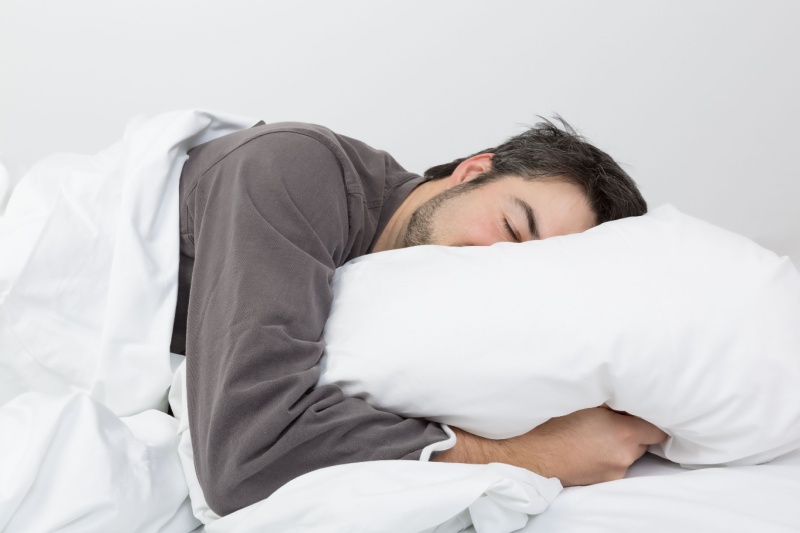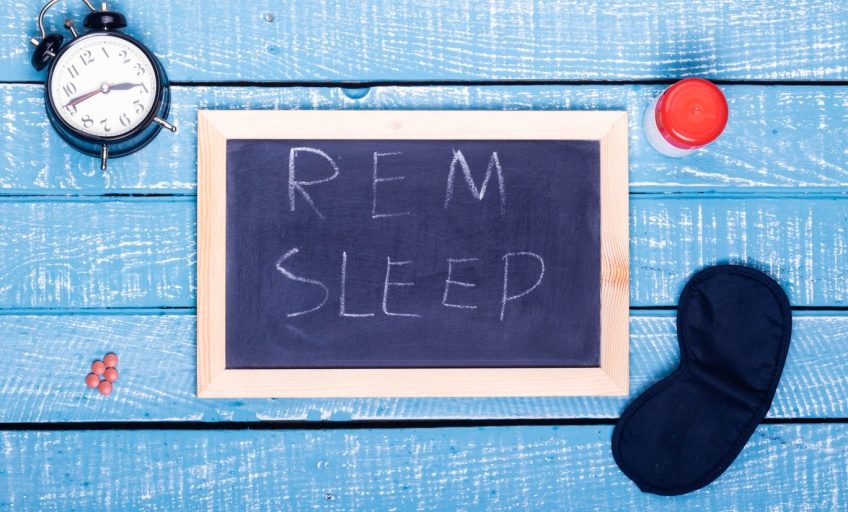You may be aware that REM sleep is the stage of sleep associated with dreams. But, did you know it is also involved in a host of important functions, from brain development to emotional processing? Most adults need about two hours of REM sleep each night.
What you need to know:
- What is REM sleep?
- The importance of REM sleep
- Factors affecting REM sleep
- Enhancing your REM sleep: 4 tips for a restful night
What is REM sleep?
Rapid eye movement sleep or REM sleep was first discovered in the 1950s when scientists studying sleeping infants noticed distinct periods when their eyes raced from side to side which earned REM sleep its name. It happens at regular intervals during the sleep period, typically every 90 to 120 minutes. It is the fourth out of four total stages of sleep. In contrast to other stages of sleep, in which your brain waves slow down, your brain is highly active during REM sleep, and your brain waves become more variable.
The role of REM in sleep cycles
All sleep is important, but REM sleep, in particular, plays an important role in sleep cycles and involves various functions:
- Memory consolidation,
- Emotional processing,
- Healthy brain development, and
- Dreaming.
The physical signs of REM sleep
Traits unique to REM sleep include:
- Quick-eye movement
- Increased brain wave activity that’s more similar to wakefulness than any other stage of sleep
- Complete loss of muscle tone
- Irregular breathing
- Elevated heart rate
- The ability to be awoken more easily than during non-REM sleep
The importance of REM sleep
Let us look at the important role REM sleep plays in:
Memory consolidation and learning
During REM sleep, your brain processes new learnings and motor skills from the day, committing some to memory, maintaining others, and deciding which ones to delete. This is how memory consolidation which is the process of preserving key memories and discarding excessive information occurs in REM sleep. Some memory consolidation also occurs in deep sleep, which is a non-REM stage.
Emotional regulation and mood
Your brain processes emotions during REM sleep. Dreams, which are more vivid in REM sleep, may be involved in emotional processing. Also, your amygdala, the part of your brain that processes emotions, activates during REM sleep. It is also associated with better mental health and as a consequence – emotional regulation and mood.
Immune function and overall health
During REM sleep, your immune system releases proteins called cytokines, some of which help promote sleep. Certain cytokines increase when you have an infection or inflammation or are under stress. Sleep deprivation may decrease the production of these protective cytokines. Our bodies also produce T-cells during sleep, white blood cells that are your body’s immune response to an infectious disease.
Factors affecting REM sleep
Various factors negatively impact REM sleep:
Lifestyle habits: Alcohol, caffeine, and screen time
Substance use has a strong impact on REM sleep. Caffeine and alcohol are known to suppress it. Also, screens can disrupt it, impacting memory and cognitive function. So, you must limit your screen time and avoid substance use. On average, you should stop drinking caffeine four to six hours before bed.
Sleep disorders
Certain sleep disorders are associated with abnormal REM sleep. These include:
- REM sleep behavior disorder (RBD) – With RBD, you sometimes act out your dreams
- Narcolepsy – When you are awake, you can experience episodes of cataplexy
- Nightmare disorder – Herein, you experience intense and distressing nightmares
- Sleep apnea – You tend to spend less time in REM sleep than others
Medications
Medications also affect REM sleep, including:
- Opioid or narcotic pain medications – used to mitigate the effects of pain
- Benzodiazepine medications – sometimes used to treat sleep disorders
- Antidepressant medications – used to treat depression
- Lithobid (lithium) – a mood stabilizer used to treat mood disorders
Enhancing your REM sleep: 4 Tips for a restful night

Now that you understand the importance of REM sleep for your well-being, here are some tips you can follow to enhance it:
Create a sleep-conducive environment
Look around your bedroom to identify factors that may prevent you from getting a good night’s sleep. Bright lights from the outside, a TV blaring in your room, and hot temperatures can prevent you from getting enough REM sleep. Hang up blackout curtains that block outside noises and lights, and turn off the TV when it is time to sleep. Make your bedroom comfortable, cozy, and relaxing.
Try and establish a consistent sleep schedule
Wake up and go to bed at the same time every day – not just on weekdays but also on weekends. Your body will eventually get used to a sleep schedule, you will be more alert and sleepy at the appropriate times.
Use stress management techniques
If you lie awake at night worrying or thinking about things bothering you, try practising mindfulness meditation. To practise meditation to fall asleep, close your eyes and focus on your surroundings in the present moment. Breathe deeply, feel the bed sheets against your skin, and listen to the sound of your fan. When your mind starts to wander, refocus on the present moment. It can help reduce insomnia and improve sleep quality.
Dietary considerations for better sleep

Here are the foods you can include in your diet for better sleep:
- Almonds – high in melatonin, magnesium, calcium, and good fats.
- Warm milk – contains four sleep-promoting compounds: tryptophan, calcium, vitamin D, and melatonin.
- Kiwifruit – contains sleep-promoting compounds: melatonin, potassium, magnesium, and calcium.
- Walnuts – contain a few compounds that regulate sleep, including melatonin, serotonin, and magnesium.
- Fatty fish – may help improve sleep because they contain vitamin D and omega-3 fatty acids, that help regulate serotonin.
Rapid eye movement sleep is an important stage of your sleep cycle. During this stage, your brain is active, and your muscles are relaxed. We need REM sleep for memory and daytime function. Many factors can influence how much REM sleep you get as mentioned above. Enhance your REM sleep by following the mentioned strategies. If you’re concerned about its deprivation, consult a doctor.
Stay tuned to the Activ Living Community. Keep up to date with the latest health tips and trends through expert videos, podcasts, articles, and much more on nutrition, fitness, mindfulness, and lifestyle conditions like Asthma, Blood Pressure, Cholesterol, and Diabetes. Activ Living ke saath sahi sehat ki shuruat ABHI karo.
You may also be interested in the following blogs:
Popular Searches
How to lower blood pressure | Fruits good for liver | Unhealthy foods | Ragi Benefits | Basal Metabolic Rate | Acupressure points for High Blood Pressure | Ayurvedic medicine for blood pressure | How to control cholesterol at home | Homeopathy for Asthma | Biological Age | Home remedies for TB | Natural beta blockers | Negative effects of internet | Types of walking | Blood pressure calculator | Blood sugar calculator | BMI Calculator





 1800-270-7000
1800-270-7000








